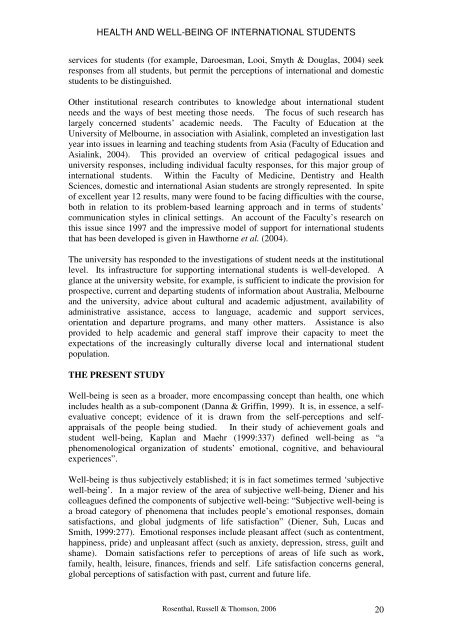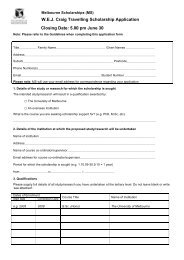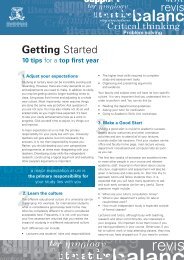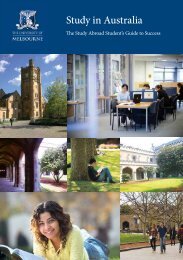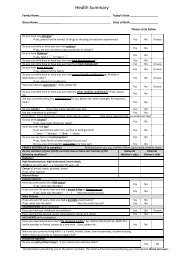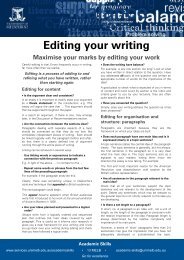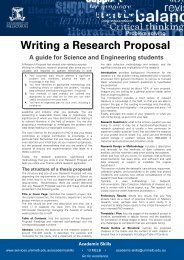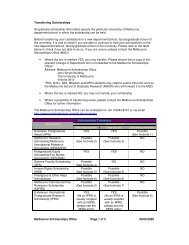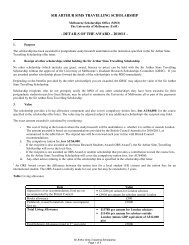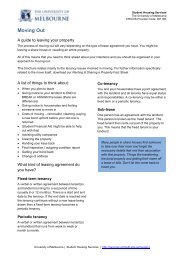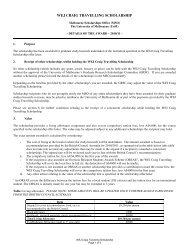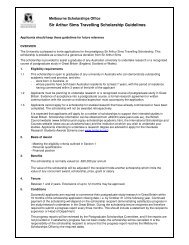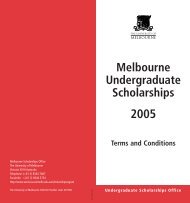a growing experience - Student Services - University of Melbourne
a growing experience - Student Services - University of Melbourne
a growing experience - Student Services - University of Melbourne
Create successful ePaper yourself
Turn your PDF publications into a flip-book with our unique Google optimized e-Paper software.
HEALTH AND WELL-BEING OF INTERNATIONAL STUDENTSservices for students (for example, Daroesman, Looi, Smyth & Douglas, 2004) seekresponses from all students, but permit the perceptions <strong>of</strong> international and domesticstudents to be distinguished.Other institutional research contributes to knowledge about international studentneeds and the ways <strong>of</strong> best meeting those needs. The focus <strong>of</strong> such research haslargely concerned students’ academic needs. The Faculty <strong>of</strong> Education at the<strong>University</strong> <strong>of</strong> <strong>Melbourne</strong>, in association with Asialink, completed an investigation lastyear into issues in learning and teaching students from Asia (Faculty <strong>of</strong> Education andAsialink, 2004). This provided an overview <strong>of</strong> critical pedagogical issues anduniversity responses, including individual faculty responses, for this major group <strong>of</strong>international students. Within the Faculty <strong>of</strong> Medicine, Dentistry and HealthSciences, domestic and international Asian students are strongly represented. In spite<strong>of</strong> excellent year 12 results, many were found to be facing difficulties with the course,both in relation to its problem-based learning approach and in terms <strong>of</strong> students’communication styles in clinical settings. An account <strong>of</strong> the Faculty’s research onthis issue since 1997 and the impressive model <strong>of</strong> support for international studentsthat has been developed is given in Hawthorne et al. (2004).The university has responded to the investigations <strong>of</strong> student needs at the institutionallevel. Its infrastructure for supporting international students is well-developed. Aglance at the university website, for example, is sufficient to indicate the provision forprospective, current and departing students <strong>of</strong> information about Australia, <strong>Melbourne</strong>and the university, advice about cultural and academic adjustment, availability <strong>of</strong>administrative assistance, access to language, academic and support services,orientation and departure programs, and many other matters. Assistance is alsoprovided to help academic and general staff improve their capacity to meet theexpectations <strong>of</strong> the increasingly culturally diverse local and international studentpopulation.THE PRESENT STUDYWell-being is seen as a broader, more encompassing concept than health, one whichincludes health as a sub-component (Danna & Griffin, 1999). It is, in essence, a selfevaluativeconcept; evidence <strong>of</strong> it is drawn from the self-perceptions and selfappraisals<strong>of</strong> the people being studied. In their study <strong>of</strong> achievement goals andstudent well-being, Kaplan and Maehr (1999:337) defined well-being as “aphenomenological organization <strong>of</strong> students’ emotional, cognitive, and behavioural<strong>experience</strong>s”.Well-being is thus subjectively established; it is in fact sometimes termed ‘subjectivewell-being’. In a major review <strong>of</strong> the area <strong>of</strong> subjective well-being, Diener and hiscolleagues defined the components <strong>of</strong> subjective well-being: “Subjective well-being isa broad category <strong>of</strong> phenomena that includes people’s emotional responses, domainsatisfactions, and global judgments <strong>of</strong> life satisfaction” (Diener, Suh, Lucas andSmith, 1999:277). Emotional responses include pleasant affect (such as contentment,happiness, pride) and unpleasant affect (such as anxiety, depression, stress, guilt andshame). Domain satisfactions refer to perceptions <strong>of</strong> areas <strong>of</strong> life such as work,family, health, leisure, finances, friends and self. Life satisfaction concerns general,global perceptions <strong>of</strong> satisfaction with past, current and future life.Rosenthal, Russell & Thomson, 2006 20


